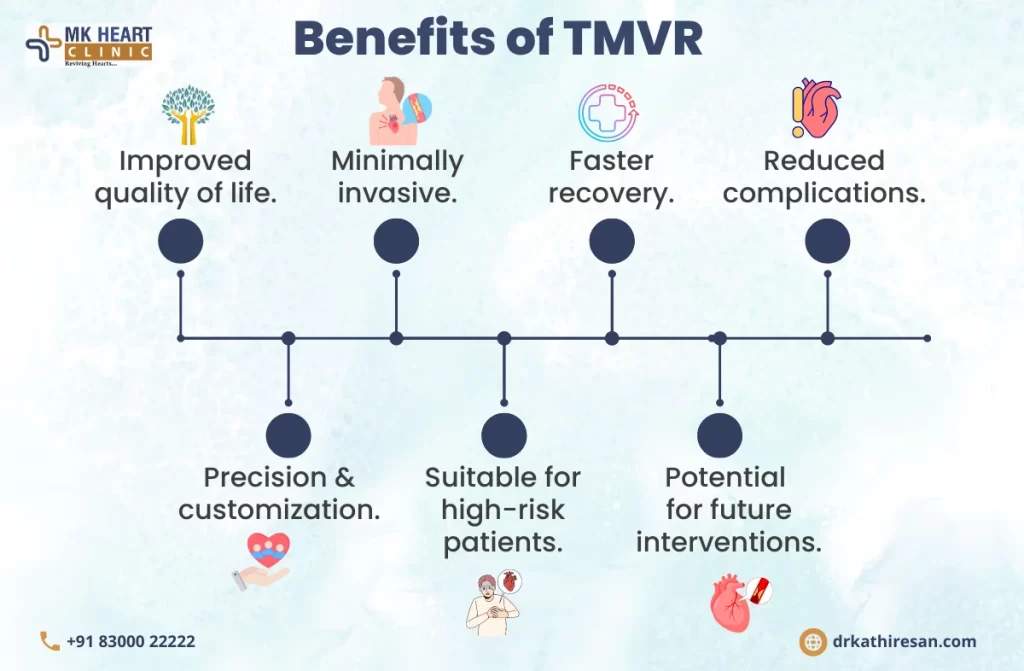Transcatheter Mitral Valve Replacement (TMVR) is a groundbreaking procedure that has revolutionized the field of cardiac care. The Transcatheter Mitral Valve Replacement in Chennai is a minimally invasive technique that offers a viable alternative to traditional open-heart surgery for patients suffering from severe mitral valve disease.
TMVR replacement involves a malfunctioning mitral valve with a prosthetic valve, delivered via a catheter-based system. This article explores the procedure in detail, including patient selection criteria, the TMVR process, benefits, and potential risks. We will also discuss the future prospects of TMVR and its impact on the management of mitral valve disease.

Understanding Mitral Valve Disease
The TMVR mitral valve is situated between the left atrium and the left ventricle of the heart. It plays a crucial role in ensuring efficient blood flow by preventing backward leakage of blood from the ventricle into the atrium.
Mitral valve disease encompasses two main conditions: mitral valve stenosis (narrowing) and mitral valve regurgitation (leakage). These conditions can lead to symptoms like shortness of breath, fatigue, and heart palpitations and requires Transcatheter Mitral Valve Replacement in Chennai.
Traditional Mitral Valve Treatment Options
Historically, open-heart surgery has been the standard treatment for mitral valve disease. It involves making an incision in the chest to access the heart and repair or replace the damaged valve. While effective, open-heart surgery is associated with significant risks, longer recovery times, and a higher chance of complications, particularly in elderly or high-risk patients.
The Rise of Transcatheter Mitral Valve Replacement in Chennai (TMVR)
Transcatheter Mitral Valve Replacement in Chennai emerged as an innovative solution to address the limitations of traditional mitral valve surgery. This procedure utilizes advanced catheter-based technology to implant a prosthetic valve within the native mitral valve.
TMVR can be performed through different approaches, such as transseptal or transapical access, depending on patient-specific factors. The development of TMVR has opened new avenues for patients who were previously deemed ineligible for surgery or at high risk.
Patient Selection Criteria for TMVR
While Transcatheter Mitral Valve Replacement in Chennai offers tremendous promise, not all patients are suitable candidates. The selection process involves a thorough assessment of various factors, such as the severity of TMVR mitral valve disease, patient anatomy, overall health, and the presence of other comorbidities.
Multidisciplinary heart teams consisting of interventional cardiologists, cardiac surgeons, and imaging specialists play a crucial role in determining patient eligibility for TMVR.
The Transcatheter Mitral Valve Replacement Process
TMVR replacement involves several key steps, beginning with the insertion of a catheter into a blood vessel, typically in the groin. The catheter is carefully maneuvered towards the heart, guided by imaging techniques such as echocardiography and fluoroscopy.
Once the catheter reaches the mitral valve, the prosthetic valve is deployed within the native valve structure. The new valve restores normal blood flow and eliminates or reduces regurgitation or stenosis.
Benefits and Potential Risks of TMVR
TMVR offers numerous advantages over traditional open-heart surgery, including shorter hospital stays, reduced recovery times, and minimal scarring. It also provides a viable treatment option for patients who are not suitable candidates for surgery.
However, like any medical procedure, Transcatheter Mitral Valve Replacement in Chennai carries some risks, such as bleeding, infection, stroke, and damage to the heart or blood vessels. Careful patient selection, comprehensive pre-procedural evaluation, and skilled interventionists are essential to minimize these risks.
When is Transcatheter Mitral Valve Replacement Performed?
This procedure is considered for individuals with severe mitral valve disease deemed high-risk or inoperable for traditional surgery.
How is the Procedure Performed?
Transcatheter mitral valve replacement is conducted using a catheter-based approach, avoiding the need for open-heart surgery. Comprehensive evaluations determine patient suitability. Consult our specialists for personalized guidance on transcatheter mitral valve replacement in Chennai.
The Future of TMVR
The field of TMVR continues to evolve rapidly, with ongoing research and development aimed at improving patient outcomes and expanding the pool of eligible candidates. Advancements in device technology, imaging techniques, and procedural expertise are paving the way for further refinement and wider adoption of TMVR.
Additionally, ongoing clinical trials are exploring the potential benefits of TMVR in specific patient populations, such as those with functional mitral regurgitation.
Conclusion
To conclude, the Transcatheter Mitral Valve Replacement in Chennai represents a significant advancement in the treatment of mitral valve disease. By offering a less invasive alternative to open-heart surgery, TMVR provides hope for patients who were previously limited by their medical condition or surgical risk. As technology advances, the future looks promising for further enhancing the efficacy and accessibility of TMVR.
Also, Read Transcatheter Aortic Valve Replacement / Implantation.


